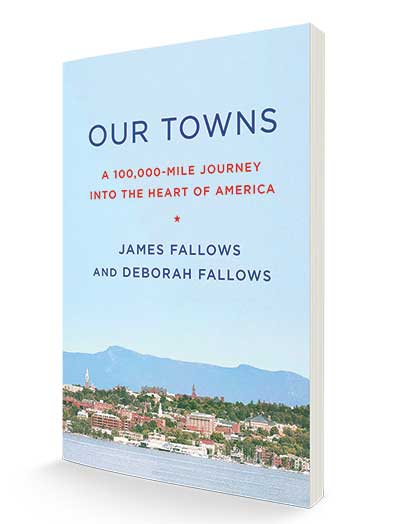Maine’s smallest city has been down but never out, author James Fallows says.
[cs_drop_cap letter=”T” color=”#006aa1″ size=”6em” ]he city of Eastport tricked out its docks to handle huge volumes of wood-based biomass fuel, but low natural gas prices undercut the energy market. Work started on a $9 million plan to turn an old cannery into a mod residential/commercial space, but a lawsuit stalled the project. The port got a lucrative gig shipping pregnant cows to Turkey, but the Syrian civil war destabilized the Middle East. And oh yeah, the breakwater collapsed and took almost two years to rebuild. But James Fallows has hope for the hard-knocks city of 1,200. A correspondent for The Atlantic and former speechwriter to President Jimmy Carter, Fallows and wife and fellow writer Deborah spent years flying a single-prop plane to oft-overlooked corners of America, studying cities’ revitalization tactics. Their new book, Our Towns: A 100,000 Mile Journey Into the Heart of America, chronicles those travels. The Fallowses visited Eastport five times and plan to return, having developed an affection for the community, the landscape, and a certain locally made condiment.How’s your supply of Raye’s Mustard holding up?
We buy that stuff by the metric ton! On one trip, we had to do some kind of special weight and balance calculation for the plane to make sure we could take off with all the mustard we were hauling back. No less recently than yesterday did I have a grilled cheese sandwich with Raye’s maple horseradish mustard on it.
From the book, it seems you experienced Eastport in a really personal way.
I think that may just be how it is in Eastport. In such a small place, everyone is doing everything all the time. We ended up hanging out at the WaCo Diner and going to people’s houses for dinner. I think a real scourge of mainstream journalism now is you show up from a New York- or DC-based publication and say, tell me about your problems, O Citizen of Left-Out America. Do you still like Trump? How bad is it here, really? Deb and I are both from small towns, and our goal was to hear about what they’re trying to do here and what the narrative of the town is.

Did the 2016 election impact your thinking about the project?
It did. Our central question became whether the real texture of the country was what we heard at presidential rallies or what we saw city by city. There’s a paradox that I think all of us in the media need to grapple with, which is that polls show that people think it’s really a terrible time for the country, but the vast majority of people think their own communities are getting better. There’s something in the communication system that either lets or makes people think their local progress is an outlier. So what Deb and I feel passionate about is giving people who are coping with local problems a sense of solidarity with people who are coping with similar problems other places.
How does Eastport fit into the big picture of small-town revitalization?
Since the Civil War, there’s been an urban-concentrating move in the U.S., but over the last 10 or 15 years, there’s been a counter wave of smaller cities having a renaissance. People say, well, we can have a better life balance, starting with the real estate costs but also with the natural attractions in a place like Eastport. The question is, can Eastport position itself to be part of the rising wave?
What could help the city do that?
The natural location is fabulous — this is the area where the Roosevelts were going for vacations. Also, if there’s one theme we tried to convey, it’s the value of the engaged life, of people feeling a sense of responsibility or pleasure in being a part of improving the world they’re in. In Eastport, it was probably the purest case we saw early on of this local patriotism, this idea that we’re probably not going to get the next branch office of Facebook, we’re not going to get a big factory, but we have other things we can try.
Presumably help isn’t coming from Washington.
It would be better if we had a national government that functioned, but at a low point in national governance, it’s all the more important to have local experimentation. It will be valuable to have all these ideas and results that are being produced all over every day. And in terms of activity per capita, ambition per square mile, of just striving with all this might to figure out the next path, we were so impressed with Eastport.
Can it push Eastport over the top?
If Eastport makes it, it will be through the force of will of its people. The city had this series of just unforeseeable challenges. Who’d have thought the Syrian civil war would affect Down East Maine? I hate to laugh, but god! They’ve had these repeated bad-luck blows, and they’re still there. And maybe at some point they’ll have a good-luck blow.

